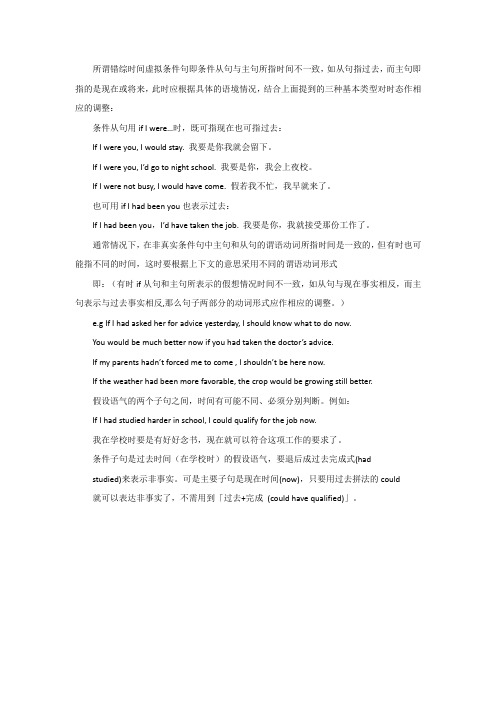虚拟语气错综时间条件句
虚拟语气的规则总结

虚拟语气虚拟语气:表示动作或状态不是客观存在的事实,而是说话人的主观愿望、假设或推测等。
一、if从句:(二)错综时间的虚拟句:通常情况下,在条件句中主句和从句的谓语动词所指时间一致, 但有时也可能指不同的时间,这时主句和从句的动作不是发生在同一时间,其动词形式要根据时间而定。
1. If I were you, I would have taken his advice. (从句指现在, 主句指过去)。
2. If I had taken my raincoat with me this morning, I would not be wet now. (从句指过去,主句指现在)。
3. If we hadn’t been working hard in the past few years, things wouldn’t be going so smoothly.(从句指过去,主句指现在)。
4. If the weather had been more favorable, the crops would be growing still better.(从句指过去,主句指现在)。
5. If we had not got everything ready by now, we should be having a more terrible time tomorrow. (从句指现在,主句指将来)??(三)省略:If 从句中含有were, should, had时,可省略if并把were, should, had提前。
例如:Were I you, I wouldn’t quarrel with him.备注:注:would, should, could与might的选择:①一般常用would,如同在真实条件句中主句常要用will一样。
常译作“将、就会”。
如:If I knew him, I would ask him for help. 如果我认识他的话,我就会向他求助。
虚拟语气和错综条件句和含蓄虚拟

虚拟语气表示说话人所言内容不是事实,而是一种假设、愿望、建议、请求、命令或猜测,有时只是说话者的主观愿望,或表达他/她的强烈情感,谓语动词用特殊形式。
一.虚拟语气在if 条件句中的用法If从句中提出一种与客观现实不相符或根本不可能存在的条件,主句会产生的一种不可能获得的结果。
条件句中的虚拟语气根据不同的时间有三种不同的形式。
2. 条件中的虚拟语气的举例(1) 现在时的条件句中的虚拟语气。
若与现在事实相反,虚拟语气的条件从句的谓语用过去式(be通常用were),主句谓语用“should (would, could, might)+动词原形”。
如:如:If he were free, he would help us. 要是他有空的话,他会帮助我们的。
If he studied at this school, he would know you well.如果他在这所学校学习的话,它会对你很熟悉。
If I were you, I would never do that. 如果我是你,我决不做那件事。
If it weren’t for (=But for) your help, I would still be homeless. 若不是你帮忙,我现在还是无家可归。
If I had more money, I would buy a car. 我要是有再多一点钱,我就买汽车了。
If there were no subjective mood,English would be much easier. 要是没有虚拟语气,英语就会容易得多了。
If I knew his telephone number,I would ring him up. 我要是知道他的电话号码,我就给他打电话了。
If I were you, I would go there at once.If my classmates were here, they would help me.If I were you, I would accept the job.If classes were smaller, children would learn more.If I were ten years younger, I would start all over again.If I had enough money, I would buy a large house.If I had time, I would go shopping with you.If I knew all the answers to all your questions, I would be a genius.If he were here now, we would ask him about it.If I had time, I would study French.If I knew her number, I could ring her. (可惜我不知道)If there were no gravity, we should not be able to walk. (实际上地球引力始终存在。
虚拟语气用法总结

概念:谓语v用不同的形式表示说话人的不同意图,这 种形式称为语气。语气分三种: 1.陈述语气:用来陈述一个事实,或提出一种看法,有 肯定、否定、疑问、感叹等形式。
He is late for class. What fun!
He is not interested in classical music. 2.祈使语气:用来表示请求、邀请、命令、警告或劝告 等(动词常用原形) Don’t be late! 3.虚拟语气:表示说话人所说的不是事实,而是一种假 设、愿望、怀疑或推测。
2.If I were you, I would accept his advice. Were I you,……
3.If it rained/should rain/were to rain tomorrow, I would stay at home.
Should it rained tomorrow/ Were it to rain tomorrow,
(或用could have done) 与将来事实相反 could/would/might + do/be
I wish (that)he_w_o_u_ld_/_c_ou_l_d_/m__ig_h_t v_i_si(tvisit) us tomorrow.
I wish (that) he__v_i_si_te_d___(visit)us today. I wish he_h_a_d_v_i_si_t_ed__u_s/_c_o_u_l_d_h_a_v_e_v_is_i_te_d__u_s (visit) us yIfeosntelyrdyaoyu. __h_a_d_li_s_te_n_e_d___ (listen)to our advice!
虚拟语气二

虚拟语气(二)一、错综时间虚拟条件句所谓错综时间虚拟条件句即条件从句与主句所指时间不一致,如从句指过去,而主句即指的是现在或将来,此时应根据具体的语境情况,动词的形式要根据它所表示的时间作出相应的调整。
If it had rained last night, the ground would be wet now.要是昨晚下过雨的话,现在地面就会是湿的。
It is hard for me to imagine what I would be doing today if I had not fallenin love ,at the age of seven with the Library in my hometown如果我不在七岁时就迷恋上了我们家乡的图书馆,我真不能想象我今天会做什么。
You would be much better now if you had taken my advice. 假若你当时听我的话,你现在就会好多了。
二、含蓄虚拟条件句所谓含蓄虚拟条件句即指将条件从句隐藏在上下文一定的短语中的一类条件句:(1)将条件隐含在介词短语中:如果句中出现了but for, without 等短语,语义又和事实不符,也要用虚拟语气;虚拟的时间根据语境来分析Without air, no one could live. 没有空气,人就不能活。
(=If there were no air, no one could live.)But for his help, he would have failed. 要不是有他的帮助,他就会失败了。
(=If it hadn’t been for his help, he would have failed.)(2)将条件隐含在某些连词(如or, or else, otherwise等)中:如果语义和事实不符,也要用虚拟语气。
I didn’t know that he was a cheat, or else I wouldn’t have believed him. 我不知道他是个骗子,不然我也不会相信他了。
错综时间虚拟与含butforwithout的虚拟(四)

错综时间虚拟与含butforwithout的虚拟(四)错综时间虚拟条件句与含有but for/without条件句的虚拟(四)虚拟语气内容的语法点较多,Master Osifu English这一讲继续为大家讲述虚拟语气。
大家可以按照虚拟语气的语法点逐条学习,Master Osifu English尽量为大家明晰思路,帮助大家掌握此知识点。
(一)错综时间虚拟条件句:即主句与条件从句的谓语动词所发生的时间不一致时,被称为“错综时间虚拟条件句”。
下面,Master Osifu English以例句的形式为大家讲解。
(1)If you had taken medicine yesterday, you would feel better now. 要是昨天你吃了药,现在会感觉更好些。
(此处if条件句是对过去的虚拟,故用过去完成时,而主句是对现在的虚拟,故用would+do的形式。
)(2)If he were not ill, he would have finished the job. 如果他没有生病,他早就完成工作了。
(此处if条件句是对现在的虚拟,故用过去时,而主句是对过去的虚拟,故用would have done 的形式。
)(二)but for/without条件句的虚拟:在含有but for/without条件句的虚拟中,首先要判断句子是哪种情况的虚拟,是现在情况、将来情况还是过去的情况?例如:Without water, the fish would die. 没有水,鱼儿会死的。
But for the teacher’s help, she could not have passed the exam. 要不是老师的帮助,她不可能考试及格。
下面让我们练习题型的形式来理解并巩固此知识点。
1._____Lucy, we _____ the book last month.A.Without; would loseB. If not; will loseC.But for; would have lostD.If it is not for; would have lose解析:答案C.解题思路,主句的last month给出的信息为过去,那么此句为过去情况的虚拟,故谓语动词为would have done形式,能与之搭配的只有but for,所以选C.2.Without the policemen’s help, they_____their lives.A.would have lostB.should loseC.might loseD. can lost解析:答案A.解题思路,首先判断此句属于什么情况的虚拟,根据句意,应为过去情况的虚拟,故主语应为would have done形式,所以选A.3.I ____sooner but I didn’t know that they were waiting for me.A.had comeB.was comingC.would comeD. would have come解析:答案D.解题思路,此题前后句时间不一致,为错综时间虚拟句,前面的句子表示过去情况,故为would have done形式。
第五讲 虚拟语气

miser- 可怜的 miserable 痛苦的,悲惨的 misery 痛苦,悲惨,不幸
miss- 送,放出 missile 导弹,发射物 mission 使命,任务;使团,代表团 missionary 教会的,传教(士)的 传教 士
inter-: 在…之间;相互;内
interact 互相作用,互相影响,互动,交往 intercourse 交流,交往,交际,性交 interface 接合部位,分界面 (使)互相联系 interfere(伴侣,配偶) (in)干涉,干预;(with)妨
LOGO
第五讲
虚拟语气
错综时间虚拟条件句 一、什么叫错综时间虚拟条件句 所谓错综时间虚拟条件句即条件从句与主 句所指时间不一致,如从句指过去,而主句即 指的是现在或将来,此时应根据具体的语境情 况,结合上面提到的三种基本类型对时态作相 应的调整: If it had rained last night, the ground would be wet now. 要是昨晚下过雨的话,现在地面就会是湿的。 You would be much better now if you had taken my advice. 假若你当时听我的话,你现在就会好多了。
universal 普遍的,全体的,通 用的; 宇宙的,世界的 universe 宇宙,万物 university (综合)大学 unicorn 独角兽 unidirectional 单向的 unisex 男女皆宜的 unisexual 单性的,雌雄异体的
semi-: 半
semiannual 半年一次的,一年两次的 semiautomatic 半自动的 semicircle 半圆形 semiconductor 半导体 semifinal 半决赛 semiskilled 半熟练的
错综时间虚拟条件句

所谓错综时间虚拟条件句即条件从句与主句所指时间不一致,如从句指过去,而主句即指的是现在或将来,此时应根据具体的语境情况,结合上面提到的三种基本类型对时态作相应的调整:条件从句用if I were…时,既可指现在也可指过去:If I were you, I would stay. 我要是你我就会留下。
If I were you, I’d go to night school. 我要是你,我会上夜校。
If I were not busy, I would have come. 假若我不忙,我早就来了。
也可用if I had been you也表示过去:If I had been you,I’d have taken the job. 我要是你,我就接受那份工作了。
通常情况下,在非真实条件句中主句和从句的谓语动词所指时间是一致的,但有时也可能指不同的时间,这时要根据上下文的意思采用不同的谓语动词形式即:(有时if从句和主句所表示的假想情况时间不一致,如从句与现在事实相反,而主句表示与过去事实相反,那么句子两部分的动词形式应作相应的调整。
)e.g If I had asked her for advice yesterday, I should know what to do now.You would be much better now if you had taken the doctor’s advice.If my parents hadn’t forced me to come , I shouldn’t be here now.If the weather had been more favorable, the crop would be growing still better.假设语气的两个子句之间,时间有可能不同、必须分别判断。
例如:If I had studied harder in school, I could qualify for the job now.我在学校时要是有好好念书,现在就可以符合这项工作的要求了。
高中英语语法-虚拟语气全总结

①错综时间条件句:当条件状语从句表示的行为和主句表示的行为所发生的时间不一致时,被称为错综时间条件句,动词的形式要根据它表示的时间作出相应的调整。
如:If you had followed my advice just now, you would be better now.If you had studied hard before, you would be a college student now.②if省略句在条件句中可以省略if, 把were, had, should提到句首,变成倒装句式。
如:If I were at school again, I would study harder.→Were I at school again, I would study harder.如果我还有上学的时机,我会更加努力学习。
If you had e earlier, you would catch the bus.→Had you e earlier, you would catch the bus.如果你来得早点,你就能赶上公共汽车。
If it should rain tomorrow, we would not go climbing.→Should it rain tomorrow, we would not go climbing.如果明天下雨的话,我们就不能登山去了。
③用介词代替条件状语从句常用的介词有with, without, but for。
如:What would you do with a million dollars" (=if you had a million dollars)如果你有100万元,你会做什么?We couldn’t have finished the work ahead of time without your help. (=if we hadn’t got your help)没有你的帮助,我们不可能提前完成这项工作。
